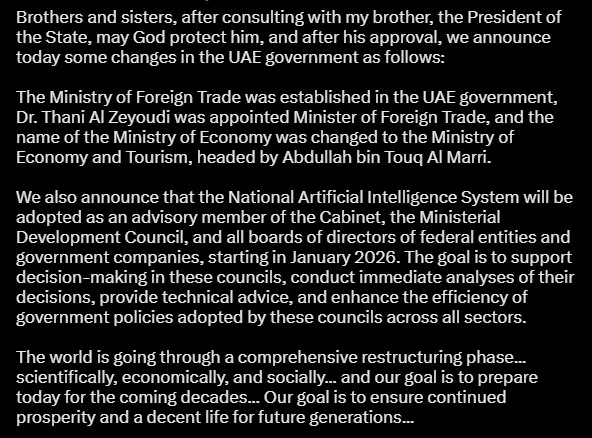UAE to Include AI in Cabinet Meetings by 2026, Announces Sheikh Mohammed

The UAE is taking a bold step into the future. His Highness Sheikh Mohammed bin Rashid Al Maktoum announced that the country’s National Artificial Intelligence System will officially join Cabinet meetings as an advisory member by 2026.
This move marks the first time in the world that an AI system will participate directly in government decision-making at the federal level. Sheikh Mohammed, Vice President and Prime Minister of the UAE and Ruler of Dubai, shared the announcement via a post on X (formerly Twitter) on June 20, 2025.
A Global First in AI Governance
“The UAE’s National AI System will join us at the Cabinet table, not as a tool, but as an advisor,” Sheikh Mohammed said. He added that this integration reflects the country’s long-term vision of becoming a global leader in future technologies.
This makes the UAE the first nation to formally assign AI a role in high-level policy decisions. The AI system is expected to analyze large volumes of data, offer predictive insights, and assist ministers in making informed decisions based on real-time analytics.
How the AI Will Participate
By 2026, the system will sit as a non-voting advisory member in federal Cabinet sessions. It will provide input on topics ranging from healthcare and climate policy to economic planning and digital infrastructure.
According to the UAE’s Artificial Intelligence Office, the system has been trained on over 1.5 million government documents, previous Cabinet decisions, and predictive modeling datasets. The AI has also passed strict ethical, legal, and cultural review benchmarks before being approved for inclusion.
Human Oversight Remains Central
Officials have emphasized that the AI system will not replace any human minister or authority. Instead, it will serve to enhance human judgment with data-backed insights. “AI will support, not override, our national values and leadership,” noted Omar Sultan Al Olama, Minister of State for Artificial Intelligence.
The UAE government says transparency, cybersecurity, and public trust are top priorities as they roll out the new AI governance model. The project aligns with the UAE Centennial 2071 strategy and its ongoing digital transformation efforts outlined in the UAE AI Strategy 2031.
Public and Global Reactions
Reactions to the announcement have been mixed, but mostly optimistic. International analysts call it “a daring yet logical next step” for a nation already seen as a tech pioneer in governance. Meanwhile, UAE residents expressed pride in the leadership’s embrace of innovation.
“It’s exciting to see our country lead the world,” said Sara Al Mansoori, a university student in Dubai. “We’re proving that AI and tradition can coexist.”
Other countries, including Singapore and Estonia, are reportedly monitoring the UAE’s rollout to potentially replicate similar advisory AI roles in their governments.
What Comes Next
Testing and simulations for the AI system will continue throughout 2025. A dedicated ethics oversight board will audit all decisions and data sources used by the AI. Full integration is expected during the second quarter of 2026.
With this move, the UAE positions itself not just as an early adopter, but as a shaper of AI governance on the world stage.

